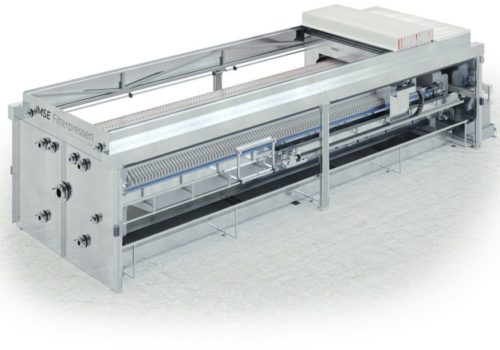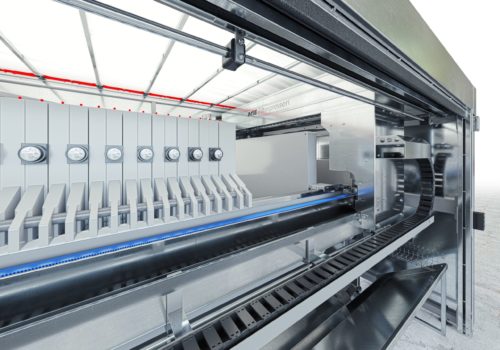Filter cloths are textile fabrics, and in cake-forming filtration, have the task of separating the solids from a (chemically aggressive and tempered) suspension, while the solids-free filtrate can flow off through the fabric. The filter cloths retain the solids in layers during the throughput while taking into account the process characteristics. A layer of the solids to be separated accumulates over time and thus builds up the filter cake. The pore size or mesh width is one of the parameters for the degree of filter efficiency. The strength of the filter fabric must transfer the force resulting from the filtration pressure to the filter support. However, the longer these cloths are used, the more solids are also deposited in the fabric structure and clog this structure. As a result, the permeability for liquids is reduced. Heavily soiled filter cloths require cleaning because the filtration time is extended, the service life of the filter cloth is shortened and the cake release behaviour deteriorates. For automatic filter cloth cleaning, MSE offers a filter cloth washing system as an automated extension module.
Depending on the application, the filter cloth edges can consist of fabric edges, e.g. felt, one-sided edge sealing (EPR) or only of filter cloth. Filter plates and filter cloths in drip-proof design (CGR) are available to seal a plate pack to the outside. The filter plates seal against each other with O-rings. The filter cloths, on the other hand, have a circumferential clamping cord sewn into them and are clamped into a groove within the O-ring seal. Filter cloths for the head and end plates are single-layer cloths. The central outlet opening on the head plate filter cloth is cut out, the filter cloth for the end plate, in contrast, does not have an opening for the turbidity inflow.
Depending on the application and field of application, there are filter cloths with different permeabilities, structures, designs (overhang filter cloth, push-through filter cloth, CGR) and materials. MSE Filterpressen GmbH will be happy to help you select the best filter cloth to optimise your filtration process.
TEXTILE TECHNOLOGY
A comprehensive range of fabrics, including monofilament and multifilament yarns, monofilament and multifilament yarn blends, multifilament staple fibre blends and other innovative products, is specially designed for filter presses. Polymers such as polypropylene (PP), polyamide (PA, Nylon, Rilsan, PA6-6, PA 6, PA 6-10, PA11, PA12), polyester (PET) and PBT are used in this range. In particular, all chemical requirements have to be met with high particle retention, optimum in terms of flow rate, moisture content and cake washing properties. In this context, the calendared filter media achieve a sufficiently smooth surface for simplified cake separation. In addition, proper thermosetting ensures dimensional accuracy.





